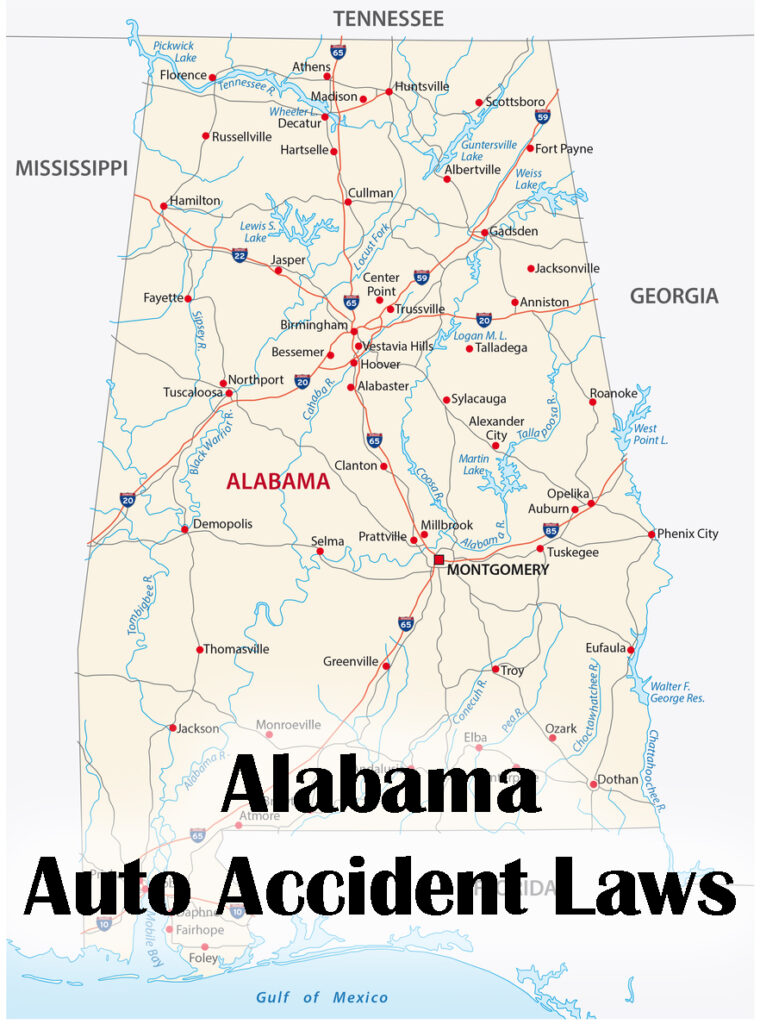Car Accident Laws in Alabama Plus FAQ’s
Car Accident Laws in Alabama
Driving a car can be risky as it can lead to auto accidents, even if you are one of the most careful and cautious drivers out there. If you live in the state of Alabama, it’s crucial for you to know the auto accident laws because an accident can occur to you at any time. In the event that you do get into an auto accident, you’ll likely find that hiring an attorney to help you handle your case can be a great benefit, especially if the insurance companies are trying to get out of paying you what they owe you. When it comes time to find the right attorney, it’s ideal to find one that specializes in auto accident law. Below, you’ll not only learn about Alabama car accident laws, but also part of the process.
The Process After Getting Into An Auto Accident
Not only will getting into an auto accident affect you physically, but also legally. Since every state has different laws, the car accident laws in Alabama are no exception. One thing that Alabama requires that only a few other states do too, is to provide proof of negligence or wantonness. This means that you’ll have to prove that the defendant was actually at fault in order for you to receive any kind of compensation or award. This can make things difficult depending on the situation. Furthermore, if the jury on your case finds you to be at fault for even 1% of the accident, you won’t receive an award.
Auto Insurance Companies in Alabama
Just like in other states, Alabama requires you to have auto insurance. If you do get into an auto accident, you’ll have to deal with your insurance company. Keep in mind that when you deal with insurance companies, they typically always try to delay the matters and you’ll want to strongly consider the small and fast settlement if you can get it.
What Happens If You’re Injured
If you had a car accident in Alabama and were injured, the laws will definitely help. Alabama law states that in personal injury cases, you’re entitled to pain and suffering, medical expenses, lost wages, mental anguish, property damage, diminished property value, and more. However, Alabama treats every case differently. The state of Alabama also has a death statute that will award on the basis of death.
Car Accident Statute of Limitations in Alabama
Every state has a “statute of limitations” that can differ from state to state. It’s a law that puts a very strict time limit on the right to bring up a lawsuit. These deadlines and timeframes can vary based on the kind of harm that you suffered as well as the case you want to file.
The statute of limitations affects car accident lawsuits in Alabama, and it also applies to personal injury cases. In Alabama, people have a 2-year deadline to claim all actions for any injury to the person or the rights of another. This also applies if the car accident results in death and the family members or personal representatives of the deceased person want to file a wrongful death suit against the person that caused or was at fault for the auto accident.
The 2-year timeframe starts running the day the injury occurs, typically the date of the auto accident. If your case isn’t started before the deadline passes, chances are that the court will dismiss the case once you attempt to file.
Guest Passenger Statute in Alabama
If you were the passenger in a car accident in Alabama and were hurt, you can also make a claim against the other driver if they were negligent, but you don’t have the right to make a claim against the driver of the vehicle that you were in, no matter if they were or weren’t negligent. However, there are a few exceptions to this rule.
Car Insurance Rules and Requirements in Alabama
Part of Alabama car accident laws include car insurance. Car insurance will likely play a part in all claims made after an auto accident. Just like in other states, Alabama requires the owners of motor vehicles to maintain a certain amount of insurance coverage in order to be allowed to operate a vehicle in a legal manner on state roads and highways. Understanding the auto insurance rules in Alabama is essential for any potential car accident case.
Survival Statue in Alabama
In Alabama, there is such a thing as a survival statute. Consider this example – 2 victims were injured in the same way in different auto accidents that were caused by another driver, but only one files their claim right away while the other doesn’t, and they end up both dying from unrelated conditions. The estate belonging to the first victim can continue to pursue the claim because the lawsuit was filed before their death; however, the estate belonging to the second victim cannot pursue a claim as it is considered to be unfair treatment.
Find An Auto Accident Attorney In Your Area
Auto Accident FAQ

